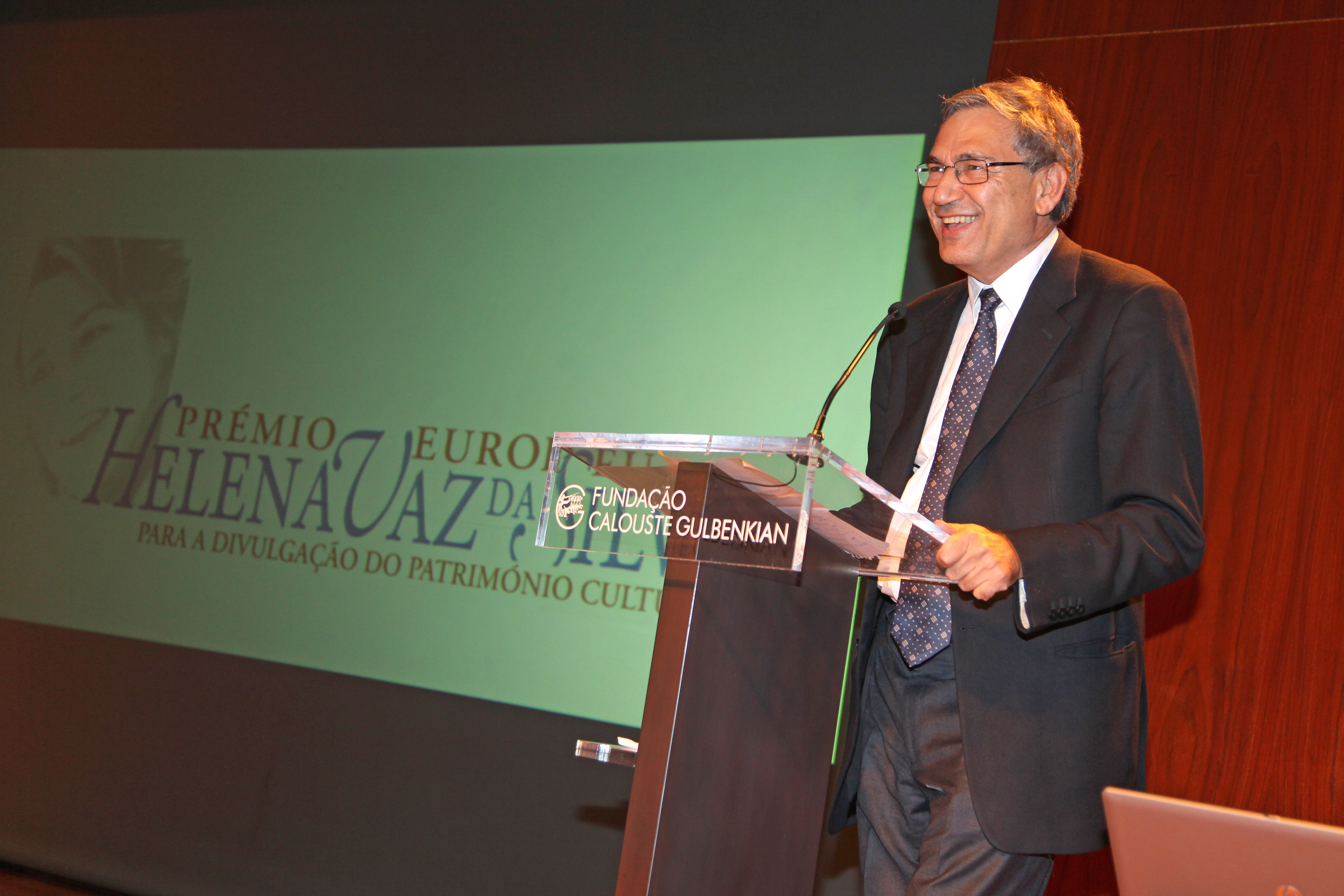Turkish writer Orhan Pamuk receives Helena Vaz Da Silva European Award 2014 in Lisbon
The renowned Turkish writer Orhan Pamuk, the Grand Prix winner of the Helena Vaz da Silva European Award for Raising Public Awareness on Cultural Heritage 2014, received the award at an official ceremony held at the Gulbenkian Foundation in Lisbon on 3 October. The Portuguese Art Historian José-Augusto França was given a Special Award and the Dutch journalist Pieter Steinz was granted a Special Mention. The event gathered 350 people and was honoured by the presence of the European Commission’s President José Manuel Barroso.

Orhan Pamuk at the Helena Vaz da Silva European Award in Lisbon on 3 October 2014. Photo: Pedro Melim
Guilherme d’Oliveira Martins, President of the Centro Nacional de Cultura, Sneška Quaedvlieg-Mihailović, Secretary-General of Europa Nostra, and Dinis de Abreu, President of the Clube Português de Imprensa, hosted the event.
Europe’s fundamental values were at the core of the award ceremony and in particular of the acceptance speech made by the Turkish writer. The laureate of the Nobel Prize for Literature 2006 paid tribute to Europe’s cultural heritage, but ended his address with a critical note.
“What makes Europe different from other continents? Equality, liberty and fraternity… The safeguard of Europe’s cultural heritage cannot be limited to the preservation of its monuments; it has to embrace the preservation of its corecultural values. And we need to have a serious discussion about these central values,” advocated Orhan Pamuk, who received the Grand Prix from the Portuguese Secretary of State for Culture, Jorge Barreto Xavier.
“When I think of Europe, I think of shared culture, from Dublin to Lesbos and St. Petersburg to Lisbon: literature and art that transcends borders. Most people, when they think of Europe, think of other things. Problems with the Euro. Overregulation and political impotence. Open borders and “non-integrable” immigrants. Ideological differences between East and West, economic differences between North and South. The disunity of Europe cannot be denied. Yet the same holds true for the cultural icons that unite us all.That is what my book ‘Made in Europe’ is about: the cultural icons that all Europeans share,” stated Pieter Steinz in a special message. The Dutch journalist, who suffers from ALS disease, was represented at the ceremony by his daughter, Jet Steinz.
“Tonight we honour the eminent laureates of the second edition of the Helena Vaz da Silva European Award. They come from three corners of our Europe: Turkey, the Netherlands and Portugal. Europe needs such engaged citizens who in different ways – through their novels, scientific work or journalistic essays – tell, directly or indirectly, the story of Europe as a cultural project. The entire life of Helena Vaz da Silva was dedicated to this noble goal. And by being here tonight, we paid tribute both to her memory and to her key contribution to a Europe of culture, and to a culture of Europe,” stated Europa Nostra’s President Plácido Domingo, in a congratulations message read at the ceremony.
“This year’s laureates of the Helena Vaz da Silva European Award are all key contributors to the process of drafting a ‘New Narrative for Europe’ which draws its energy and inspiration from the resonating power of the symphony of its cultures. Only in this way shall we be able to engineer the much needed renaissance of our continent, of our civilisation and, above all, of the aesthetical and ethical values which are fundamental to our common European edifice,” stressed Plácido Domingo.
“When Helena Vaz da Silva was a prominent member of the European Parliament, she was a true champion of culture as a key resource for Europe’s prosperity and stronger integration. Today, another great European figure from Portugal has been pursuing this same goal: Mr José Manuel Barroso. Thank you for having been the very first President of the European Commission who has advocated passionately that culture is at the heart of the European project. And thank you for your personal commitment to promoting ‘A New Narrative for Europe’ based on its culture,” stated Sneška Quaedvlieg-Mihailović.
“Helena Vaz da Silva was a convinced Europeanist, strongly engaged in preserving our cultural heritage, and, at the same time, an enthusiastic of change. I am certain that she would have appreciated to contribute to the New Narrative for Europe initiative. In the Declaration presented in Berlin last March, the artists, scientists and intellectuals who have participated in this initiative stated: ‘Europe is a moral and political responsibility, which must be carried out, not only by institutions and politicians, but by each and every European.’ This question is central to the future of Europe. In order to mobilise each and every European citizen, we need to promote culture and cultural heritage; we need to honour personalities such as Helena Vaz da Silva; and we need the contribution of great Europeans – even without being part of the European Union –, such as Orhan Pamuk, José-Augusto França and Pieter Steinz,” affirmed President Barroso.
The European Award for Raising Public Awareness on Cultural Heritage, named after the Portuguese journalist, writer, cultural activist and politician Helena Vaz da Silva (1939-2002), acknowledges exceptional contributions to the communication on cultural heritage and European ideals. The prestigious Italian writer Claudio Magris won the first edition of this Award in 2013.
Prior to the Helena Vaz da Silva Award Ceremony, there was a special session to honour the two Portuguese winners of the 2014 European Union Prize for Cultural Heritage / Europa Nostra Awards: the Historical Route of the Lines of Torres Vedras, which won an award in the category Conservation, and the Radio Programme ‘Encounters with Heritage’, which got an award in the category Education, Training and Awareness-Raising.
(Courtesy of the European Commission Audiovisual Sevices)
Speeches
Plácido Domingo
Pieter Steinz
Guilherme d’Oliveira Martins
Media coverage
Programme
Helena Vaz da Silva Award Ceremony






